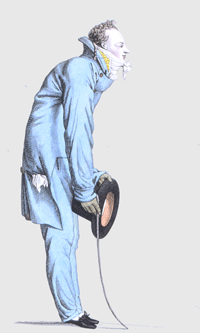
Reviews | Hosen, weiblich (Extracts)
- Do you have something against women in trousers? Honestly not? Men in skirts? That's different, of course. Why? Because trousers are not only a gender-specific attribute, but also a prerogative, and a male one at that (…). The gradual appropriation of trousers by European and American women occurred over the last 200 years. This process has been documented by the historian Gundula Wolter in her dissertation "Hosen, weiblich" (Trousers, female), a cultural history that is also partly a history of emancipation. The story is not only about leggings of the most diverse and most comical nature, but also about the rising and falling chant of the goat that accompanied every female advance.
(Elsemarie Maletzke, DIE ZEIT, 2. June 1995) - Gundula Wolter, who knows what she is talking about, having written a well-founded cultural history of men's trousers as early as 1988 (…), now goes in her PhD on the basis of serious source research into female trouser-wearing in all its ramifications up to its official establishment (…). Her smart text is stimulating, witty and often surprisingly illustrated. And although the coveted garment did not bring the hoped-for perfection to the partnership of man and woman, the conclusion of her history of emancipation is: "female culture gained strength through trousers." After all.
(Sigrid Metken, Frankfurter Allgemeine Zeitung, 29. March 1995) - In art historical research, 'fashion' is still considered a half-baked endeavour. All the more reason to rejoice at every dissertation written with meticulousness and appetite. (…) G. W. has been pursuing fashion for years in research and teaching as a claim to cultural history. She has been able to weave the threads lengthwise and crosswise from a rich fund (...). To pursue the history of women's trousers means, writes Gundula Wolter, not only to discuss a question of costume history, but at the same time to trace a piece of female emancipation history. The study aims to place the few serious (…) detailed analyses in an overall context and to partially close the obvious research gaps on the topic of 'women in trousers' through additional research. This claim is excellently fulfilled by the doctoral candidate.
(Harald Brost, Nassauische Annalen 107/ 1996) - The self-evidence with which we perceive women in trousers appears during the reading of "Hosen, weiblich" (Trousers, female) as not self-evident at all. For Gundula Wolter shows how lengthy and laborious the conquest of the "fabric tubes" by women was. And thus at the same time tells the story of women's emancipation. (...) Gundula Wolter reports on dress constraints, the limitation of the female crotch and its gradual liberation in her differentiated study, which could become a standard work of fashion literature. (…) Fashion as a mirror of culture - what can be more exciting for the industry?
(TextilWirtschaft, 17.11.1994, S. 48) - ‘Trousers, Female. Cultural History of Women's Trousers’ is (…) by no means to be lumped together with the various product-loving, sprawling feuilletons about pipe cleaners and champagne corks. The history of female mobility, of the free outing, and consequently of women's political and individual freedom is closely linked to the female right to wear trousers.
(Bettina Loidl, Der Standard, 10. February 1995) - The author unearths: scientific texts, feuilletonistic articles, popular sayings, and that already mentioned rich pictorial material about completely unknown versions of trousers, whether as undergarments or outerwear. The rage that accompanies the reading of many a line of biologic codification of women in the source material (...) is caught by the author's use of subtle irony and, quite incidentally, also exposes the salacious voyeurism that characterises the majority of the few publications that have appeared so far on the subject of research, mostly by male writers. Her analytical integration of the phenomenon leaves all piquancy (...) behind, not without eliciting its socio-cultural and gender context from the very wit and inventiveness - and often unintentional comedy - that characterise the arguments pro and con (…).
(Hanne Loreck, Frauen Kunst Wissenschaft H. 17, 1994) - Wolters' book is a pioneering work by women and impresses with its admirable wealth of sources. One would like to quote half the book.
(Christel Dormagen, Literatur-Frauen, 9. December 1994)